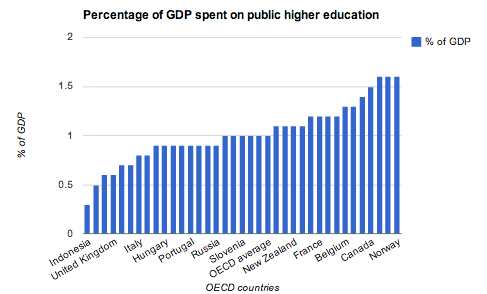Higher education: how does the UK rank internationally?
"Domestic tuition fees, unheard of only 15 years ago, have been trebled this academic year, while 80% of direct public funding has been withdrawn from undergraduate teaching. Even before these changes, public spending on higher education was lower in the UK than almost any other developed country, while business spending on research and development was equally low and falling. Now, tuition fees in England are, on average, the highest in the world."
The Guardian, November 12, 2012
In an editorial introducing the newly-launched Council for the Defence of British Universities, Professor Howard Hotson of Oxford University laments the purportedy dire state of British higher education, highlighting plummeting government spending and growing costs for students.
The academic claims that though tuition fees in England are the highest in the world, public spending on higher education is lower than almost any other developed country.
Tuition fees
Both claims are based on the Organisation for Economic Coopertaion and Development (OECD) 2012 Education at Glance report, which distinguishes between public institutions, government-dependent private institutions and independent private institutions.
Though the report was published very recently, it presents data from three years ago; as a result, it's difficult to make conclusions about the UK's present-day ranking.
Taking only public and government-dependent private institutions into consideration reveals that overall Hotson's claim is not far-fetched; the OECD's league table saw our country in a fairly high position for expense in 2009, in the company of the higher education systems of the United States and South Korea.
As of 2009, public institutions in the US pocketed an average of around £4,000 in annual tuition fees ($6,312), whereas Korean universities charged £3,270 ($5,193) annually. At that point full-time undergraduates in England were liable to pay tuition fees of up to £3,225.
After the trebling of the tuition fees since then, it is certainly fair to say tuition fees in England are likely to be among the highest in the world. Until OECD is updated with 2012 fees, however, we can't know for sure whether England will secure the top spot.
Public spending on higher education
OECD figures on higher education spending as a percentage of GDP for all OECD and G20 countries - with the exception of Turkey, Greece, Luxembourg, India and China - can be conveniently charted in the heatmap below.
What we learn from this map is that countries like Brazil, Italy, Indonesia, South Africa and Russia, amongst others, spend a lower percentage of their GDP on higher education. UK spending is on a par with developed countries such as Germany, Iceland and Spain. What's also interesting is that though the US spends a higher percentage of its GDP on higher education (twice as much as the UK, with 2.6%) a considerable chunk goes to fund private institutions which charge students an average of $23,000, or £14,500.
Overall, though public spending on higher education in Britain for 2009 was below both the OECD and the EU21 average - respectively 1.6 and 1.9 per cent of GDP - the claim that it is lower than almost any other developed country calls for more nuance.
If we, however, look at what portion of GDP is spent on public, as opposed to private, higher education, this 2011 OECD report paints a more bleak picture. As of 2008, the UK spent 0.6% of its GDP on public higher education, with 0.6% devolved to private higher education institutions. As a result, it's right at the bottom of this list of OECD countries, along with Indonesia, Japan and Korea.

Once again, it's worth pointing out this data is four years old, and information on countries such as China, Luxembourg, Greece, India, South Africa and Saudi Arabia is not available.
Conclusion
In conclusion, it is fair to say Professor Hotson's claims are likely valid. However, we have got in touch with the author of the article to ask for more clarity on his source for undergraduate teaching expenditure, and will update as soon as we hear back.
---
Flick image courtesy of kafkan